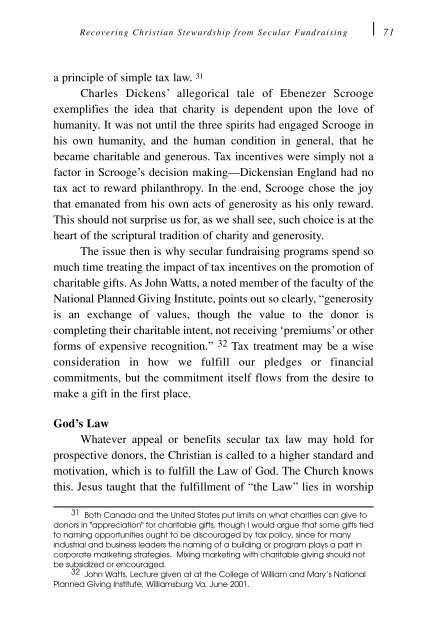Passionate Steward - 10th Anniversary Edition
10th Anniversary Edition of The Passionate Steward - Recovering Christian Stewardship from Secular Fundraising (St. Brigid Press - 2002).
10th Anniversary Edition of The Passionate Steward - Recovering Christian Stewardship from Secular Fundraising (St. Brigid Press - 2002).
Create successful ePaper yourself
Turn your PDF publications into a flip-book with our unique Google optimized e-Paper software.
Recovering Christian <strong>Steward</strong>ship from Secular Fundraising 71<br />
a principle of simple tax law. 31<br />
Charles Dickens’ allegorical tale of Ebenezer Scrooge<br />
exemplifies the idea that charity is dependent upon the love of<br />
humanity. It was not until the three spirits had engaged Scrooge in<br />
his own humanity, and the human condition in general, that he<br />
became charitable and generous. Tax incentives were simply not a<br />
factor in Scrooge’s decision making—Dickensian England had no<br />
tax act to reward philanthropy. In the end, Scrooge chose the joy<br />
that emanated from his own acts of generosity as his only reward.<br />
This should not surprise us for, as we shall see, such choice is at the<br />
heart of the scriptural tradition of charity and generosity.<br />
The issue then is why secular fundraising programs spend so<br />
much time treating the impact of tax incentives on the promotion of<br />
charitable gifts. As John Watts, a noted member of the faculty of the<br />
National Planned Giving Institute, points out so clearly, “generosity<br />
is an exchange of values, though the value to the donor is<br />
completing their charitable intent, not receiving ‘premiums’ or other<br />
forms of expensive recognition.” 32 Tax treatment may be a wise<br />
consideration in how we fulfill our pledges or financial<br />
commitments, but the commitment itself flows from the desire to<br />
make a gift in the first place.<br />
God’s Law<br />
Whatever appeal or benefits secular tax law may hold for<br />
prospective donors, the Christian is called to a higher standard and<br />
motivation, which is to fulfill the Law of God. The Church knows<br />
this. Jesus taught that the fulfillment of “the Law” lies in worship<br />
31 Both Canada and the United States put limits on what charities can give to<br />
donors in "appreciation" for charitable gifts, though I would argue that some gifts tied<br />
to naming opportunities ought to be discouraged by tax policy, since for many<br />
industrial and business leaders the naming of a building or program plays a part in<br />
corporate marketing strategies. Mixing marketing with charitable giving should not<br />
be subsidized or encouraged.<br />
32 John Watts, Lecture given at at the College of William and Mary’s National<br />
Planned Giving Institute, Williamsburg Va, June 2001.




